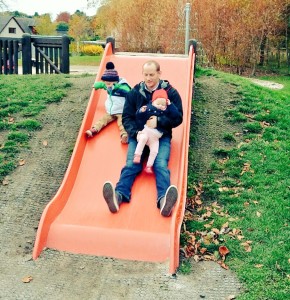Building Resilient Boys: Part 1 – The Early Years
Welcome to the first installment of a two-part series on how to build resilient boys. This part will focus on young boys – toddlers mainly. For the second installment I’ve drafted in the help of a Dad who has plenty of experience with boys and toughening them up. More on that later.
Resilience isn’t a word you hear very often. A useful definition is:
The capacity to recover quickly from difficulties, toughness (Google)
But how does that apply to a father-son relationship? And can resilience have any meaning or value for toddler age boys?
If you stumbled across this post on Google (other search engines are available) you’re either intrigued and want to read on.
Or you’re horrified.
Good.
Here’s some advice: stop reading and go ‘back’ in your browser to whatever generic foo-foo parenting blog you came from. This post is about raising your boys to tough: adaptable, disciplined, resilient. You’re not going to be any less offended if you keep reading.
The Problem: Modern Society has Created Weak Men and Boys
September 1944. The second world war was drawing to a conclusion. The Allies begin a major offensive aimed at ending the war before Christmas. This was the now infamous (and ultimately unsuccessful) Operation Market Garden.
69 years later and I’m standing opposite a grand looking town house in Oosterbeek – a leafy suburb in the Netherlands. In this building and the surrounding areas, British Paratroopers fought to a man against unimaginable odds.
A few hundred metres away lies the cemetery. Rows and rows of pristine gravestones stretch on and down the slight hill. Walking between them I notice the ages of the fallen: 18, 19, 20, 18 again. Young men. ‘Kids’ by today’s societal standards. But tough, committed and paying the ultimate price for their country.
These young men were resilience personified. Their memory lives on.
Back to here and now. What does one emotional account of a war cemetery have to do with raising boys? Do you see combat as the ultimate fulfillment for young men? A dangerous thought.
But toughness, discipline and robustness that was common place in our own childhoods seems to be lacking in the lives of our own boys. Even play is sanitised and safe.
Nazism and similar doctrines took virtues of strength and discipline and corrupted them. The natural (and correct) reaction against such teaching has resulted in the slow decline of masculinity to the point where male expression (in all ages) is discouraged.
A word of caution: looking to the past with rose tinted spectacles is flawed. All things were not necessarily better in the ‘good ol’ days’. But there is a risk of throwing the baby out with the bathwater.
So, resilience in boys is generally discouraged in our times. But how does that manifest itself? And is there a cure?
The Symptoms: From Birth Onwards, Resilience in Boys is Discouraged
Type ‘Controlled Crying’ into any search engine and you’ll get both sides of the argument. Some parents think it’s the way forward, others see it as the epitome of modern barbarism. Parenting forums are packed with posts and discussions on the cruelty of controlled crying (Controlled crying is a method which involves leaving your child to cry for a period of time. Some parents see it as essential for sleep training. Others see it as inhuman.)
A brief selection of the main search results looks like this:
- Controlled crying – is this cruel. HELP!
- Controlled crying and why I could never do it.
- Why I stopped controlled crying and made my toddler happier.
You’ll be relieved that I’m not going to discuss the merits of controlled crying. Please refer to your generic foo-foo parenting blogs for that kind of information.
What I’m concerned with is the general principle: That any kind of discomfort for your children should be avoided at all costs. Including your own sanity and sleep quality.
Heaven forbid that little Jack/Oscar/Seth would have to spend fifteen minutes alone in a room without his Daddy to comfort and soothe him.
If you start this way, the precedent is set.
Imagine this: Your son falls and bangs his knee in the park. He starts to cry. Immediately you drop everything and sprint to where he lies screaming. Usain Bolt has nothing on you when skinned knees are involved. You gather him in your arms, rocking him like a baby until the sobs fade and eventually stop. Offering him a chocolate to cheer him up, you suggest that it might be time to go home anyway. This becomes the standard reaction to minor bumps and scrapes.
Congratulations.
You’ve taught your toddler son the following:
- You will always be there to help him up, no matter what difficulty he is in.
- You’ll drop everything and run to help him. That’s called helicoptering.
- Your primary function is to provide him with emotional comfort.
- Chocolate is the cure to emotional and physical pain
- When the going gets tough, quit and leave.
Boys will never become resilient under this type of tutelage. Instead they will grow up entitled but lacking in self confidence and social awareness. They’ll probably develop an anxiety disorder or two later in life (see the article on helicopter parenting above) as well.
The Cure: Persistently Pushing the Boundaries of Comfort
Although I’ve been at this fatherhood thing for only a few years and still feel like a novice, I’ve been pushing the boundaries of my own comfort since I left school aged 17.
What I’ve learned is this:
Discomfort does not have to be a negative experience. Instead it teaches resilience, resourcefulness, courage and discipline. I haven’t always been the most motivated I could be but the general trend has been actively seeking out challenges that will make or break me.
My own father was an adventurer. His marked copy of Munro’s Tables (a mountaineering book) testifies to this. My mother lived outside her comfort zone for several years. Adventure and challenge is in my very genetic and cultural makeup.
I want to pass that sense of challenge and adventure on to my son. He’s young but already has an adventurous, wild spirit. Our times hiking together are precious.
When he falls, I don’t rush over to gather him into my arms.
I wait to see if he can pick himself up on his own. I’ll still comfort him when he needs it. But that’s the key phrase – when it’s needed. If he doesn’t immediately get up, I’ll help him, telling him kindly:
You’re OK. Come on, get up. You’re not hurt.
Pushing the boundaries of comfort in a controlled and consistent way was how I was raised and is how I’m raising my son. Will he thank me one day? Maybe. I’d rather he didn’t even notice.
Closing Thoughts – Do it for the Right Reasons
Resilience in Boys doesn’t start with them, it starts with you. Your example to your son is where he takes his cues.
Fail to educate him and someone else will.
Build resilience not because you think he’s weak, but because you want him to grow up strong, independent and in control of himself, his thoughts and his emotions.
Worried you don’t make the cut? Reading Gorilla Mindset is a good place to start. Going to the gym and building a fit, strong body will also help.
Remember: Be compassionate. Toughness shouldn’t come at the cost of your relationship.
P.S. Stay tuned for Part 2. Written from a different perspective by a good friend of mine, it’s a fitting accompaniment to Part 1.




Excellent post Neil. Even though I’m not a dad (yet), I’m storing away all this information for a further date.
Keep up the good work. (And I’ve noticed your writing has steadily improved. A nice punchy style, I like it.)
Thanks Ben and I’m glad it strikes a chord with you even though you’re not a Dad at the moment. Thanks for your comments on my writing style too. I’ve been trying to let things ‘flow’ a little better. I took time editing this post too over time which I think has helped instead of hitting publish straight away.
Neil,
Loved this post. You are right to share your thoughts so plainly on this. Resilience is a virtue to be encouraged in just the same way as honesty, compassion and loyalty.
Thanks Tom and I’m looking forward to reading your thoughts on the subject.
Great article. Couldn’t agree more. It pains me to hear people use their own self comfort as an excuse to “give in” to children (sleeping in same bed, eating junk food, etc). I have 4 girls and 1 boy. My boy being the youngest. My wife and I were joking one night about all the pink and the girl toys and wondering how he would fare. Just then, he ran up to us with a barbie doll in his hand and turning it into a gun, he began to shoot us with it. We laughed and looked at each other and agreed “he’s going to be alright”
Thanks for your comment Chris. Yes I think we’re on the same page with parents who allow prolonged co-sleeping and the obsessive risk aversion that some parents have. It’s important that kids have support from us but not at the expense of their own sense of toughness, independence or their ability to be resilient. Sounds like your boy is coping fine with being outnumbered!!